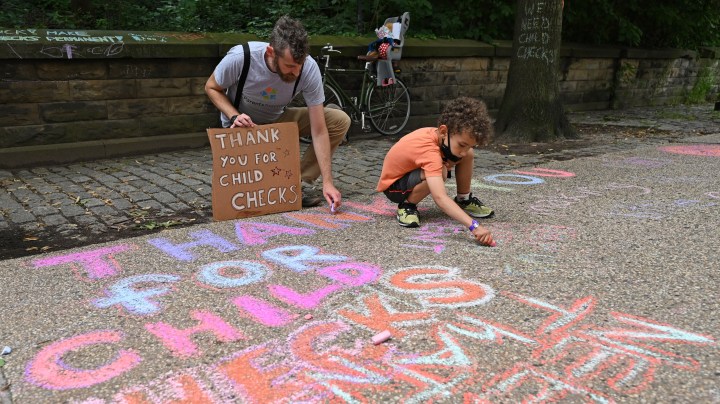
Did the enhanced child tax credit really reduce household poverty?
Did the enhanced child tax credit really reduce household poverty?

The American Rescue Plan, signed into law last year, provided about $1.9 trillion in pandemic-related stimulus. Among other things, the law temporarily overhauled the child tax credit by allowing for monthly payments and boosting the amount of money allocated to each child. A recent study looked at the effects of the expanded child tax credit on families.
Marketplace’s senior economics contributor, Chris Farrell, spoke with “Marketplace Morning Report” host David Brancaccio about the study’s findings. The following is an edited transcript of their conversation.
David Brancaccio: All sorts of help from the government for people during the pandemic. The child tax credit, again, how did that work?
Chris Farrell: So, from July through December of last year, families and more than 61 million children received monthly payments of $300 per child under the age of six and $250 between the ages of six and 17. Now, it was an enhanced credit: the money was paid out monthly instead of waiting to be claimed on this year’s tax return. And by the way, the enhanced tax credit, it has expired.
Brancaccio: And you’re seeing preliminary evidence that the credit did lower childhood poverty, which was the idea?
Farrell: Yes, there are some very early studies and [along with] reduced childhood poverty, it increased spending on food and it reduced food insufficiency. However, there are economists who worry that the program wouldn’t be as effective as these initial reports suggest when it comes to reducing poverty. And the reason is there are economic models that suggest the extra payments would reduce the incentive to work.
Brancaccio: So some simulations predicted maybe a drop in employment among families, especially those living on lower incomes. A recent study by four economists used real-world employment data from before and after this special program. What’d they find?
Farrell: The bottom line by these four economists is they found only small and insignificant effects from the credit on both employment and labor force participation rates. And here’s the really important point, the results held for families living on lower incomes. So the bottom line, they say, is that the expanded child tax credit did not have a negative short-term employment effect that offset its documented reductions in poverty and hardship.
Brancaccio: Concerns about the employment impact of various social support programs often erupt when the programs are increased. Opponents to hiking the benefits say, “Hey, it’s gonna keep people from wanting to work.”
Farrell: Yes, there’s a wonderful set of studies by economist Gareth Olds, and he looked at the expansion of the food stamp program in the early 2000s. And his research showed that food stamps reduced one kind of risk, lack of food for the family, but the result was to encourage another form of risk-taking: entrepreneurship. So what often happens, David, is that the additional money can also help pay for child care, auto repairs and reduce other barriers to employment among families who are living on low incomes.
There’s a lot happening in the world. Through it all, Marketplace is here for you.
You rely on Marketplace to break down the world’s events and tell you how it affects you in a fact-based, approachable way. We rely on your financial support to keep making that possible.
Your donation today powers the independent journalism that you rely on. For just $5/month, you can help sustain Marketplace so we can keep reporting on the things that matter to you.

















